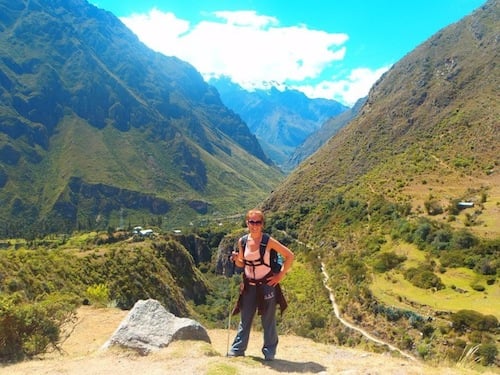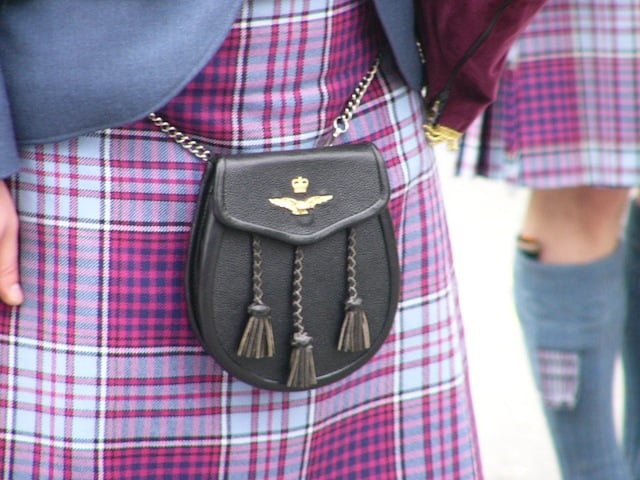
I have compiled a list of my top safety tips, many of which apply to group travelers, as well.
1. Don’t Tell Everyone You’re Alone
While I tell other travelers in my hotel that I’m traveling alone when trying to put a group outing together, it’s something I try not to make obvious when exploring. If a stranger asks you who you’re traveling with, tell them your husband/wife/friend is in the bathroom and will be out in a minute. Moreover, if you ever feel uncomfortable, move to a very public area, and even start chatting to someone to make it look like you’re traveling together.
2. Always Carry Your Hotel’s Business Card
When traveling through a foreign place it can be difficult to remember addresses and navigate directions. While you may want to learn the public transport system in order to save money, when it’s late at night or you’re in an uncomfortable situation getting home quickly in a taxi is the smartest option. Carrying your hotel’s business card allows you to hand it to the driver without any language or directional issues and get back to safety quickly.
3. Upon Arrival At Your Hotel, Ask For An Annotated Map
While most travelers ask for a map upon arrival, you should also ask hotel staff to annotate it so you know which areas are safe to explore on your own and which you should steer clear of. Memorize it and keep it on you at all times in a hidden spot, as constantly looking at it will make it clear to potential thieves and those looking to take advantage of you that you’re unfamiliar with the area.

4. Sign Up For The Smart Traveler Enrollment Program
If you’re a US citizen, the Smart Traveler Enrollment Program is a free program designed to help keep travelers safe. By entering your information into their system before you leave, the government is then better able to assist you in the event of an emergency. You’ll also be able to subscribe to receive travel warnings and alerts pertaining to your destination(s).
5. If You’re Being Followed, Don’t Stop
I’ve done numerous solo backpacking trips, and I can honestly say this has only happened to me once. I was in Rio de Janeiro, and had made the mistake of pulling out my wallet to get my bus fare ready before even getting to the bus stop. The man looked right at me with a menacing glare, and then began following me to the stop. I looked him confidently in the eye to let him know I knew he was there, and began walking quickly but assertively to the nearest group of people and planted myself in the group. I even smiled and waved to the chatting bunch to lead the potential thief to believe I knew them. After looking me up and down one last time, he walked away defeated.
6. Prepare For Trouble Before You Leave Home
Before leaving for your trip, make copies of your passport, visas, ATM card, credit cards, birth certificate, driver’s license and other important documents or ID cards. Leave one copy at home with your family or a close friend, and take another to hide somewhere in your bag, away from the originals. This will save you much trouble if anything gets lost or stolen.
7. Invest In Pickpocket-Proof Clothing
Having valuables out in plain sight when traveling makes you a walking target. In fact, I suggest leaving anything you can’t live without — your Grandmother’s jewelry, your Rolex watch, that pricey Macbook Pro — at home. That being said, there are certain valuables like money, credit cards, debit cards and cameras that are essential when traveling. Instead of carrying them in a purse or in an easy-to-rob pocket, invest in underwear, tank tops and pants with hidden interior pockets to keep your things safe.

8. If You Do Carry A Bag, Keep It In Front Of You
For women, the answer is simple: bring a purse or bag where the strap crosses over your body and rests on your hip. These can be easily held against the front of your body. For men, I recommend wearing a backpack as a frontpack. It may sound silly, but I’ve had numerous friends have thieves open their backpack zippers and pull out money, cameras and phones without them even noticing. Always have your belongings in sight.
9. Don’t Get Distracted
One of the most common tactics thieves use to pickpocket travelers is distracting them with a chaotic or interesting situation. Some may simply engage you in conversation or have children surround you and starting high-fiving you, while others will go so far as throwing a baby so you focus on catching it. When I was in Barcelona, some men from my hostel and I decided to check out the bars on Las Ramblas. On the way, an attractive woman went up to one of them and started fondling his nether region. While his instinctual feeling was flattery, it should have been to become more alert. Not surprisingly, her main goal was getting his wallet, which she did.
10. Try To Blend In With The Locals
Instead of making it obvious you’re a tourist, leave your Yankee’s t-shirt and fanny pack at home and instead try to assimilate with the locals. Obviously if you’re skin and physical features are different you can’t help that, but you can still takes steps as to not make it immediately obvious you don’t know the lay of the land. Research customs beforehand so you don’t make any social faux pas or offensive gestures, and try to wear similar clothing to the people in the community.
11. Don’t Assume Your Hotel Room Is Safe
I’ve met many travelers who assumed they could leave their valuables lying around their hotel room, only to have money, passports and electronics “go missing.” I don’t care if you’re staying at a budget hostel or a five-star hotel, thefts happen. And, don’t always trust the front desk with your things, either. I met one traveler who left his money and passport with the front desk of his hostel. When he returned for his valuables, they pretended they didn’t know what he was talking about. To keep your things safe, make use of in-room lockers and safes, where only you know the combination.

12. Don’t Bring Anything You Wouldn’t Mind Losing
While you may love your wedding ring, designer purse and MacBook Pro, do you really need to bring these with you on your trip? My advice is to leave anything you would be devastated to lose at home. When I travel, I leave my expensive laptop at home and instead bring a cheap netbook. Moreover, I don’t bring any jewelry or any item with a designer label. The most valuable thing I bring is my point-and-shoot camera, and when I’m out on the streets I do not make it obvious that I’m carrying it.
13. Learn How To Defend Yourself
Taking a self-defense class is not only smart for solo travelers, but for everyone. Whether you’re on a trip or at home, violent attacks are possible. Learning how to defend yourself will not only give you skills to get out of dangerous situations, but will also make you a more confident solo traveler.

14. Limit Your Alcohol Consumption
Whenever you are so drunk people need to take care of you, you’re making yourself vulnerable. This is especially true if you’re traveling alone in a foreign country. At least if you’re at a bar you near home, you’ll have some familiar faces and nearby friends to lookout for you. When traveling solo, however, you need to be able to fully take care of yourself at all times. This doesn’t mean you can’t go out for drinks, just always make sure you’re retaining control.
15. Always Trust Your Gut
This is the most important tip on the whole list. Your gut is almost always correct. If you meet a new person, but something about them is rubbing you the wrong way, get away from them. When you’re wandering around a new neighborhood and suddenly get a sick feeling in your stomach, hop in a cab. If you check in to a hotel but something just seems unsettling, check out and find somewhere else to stay. Never underestimate the power of your own intuition.
16. Know A Few Useful Phrases In The Local Language
While nobody’s expecting you to become fluent in another language before your vacation – although, if you can, you’ll certainly have an advantage – knowing a few useful phrases is crucial. Along with being able to ask where the nearest bathroom is, how to order food and the proper way to greet someone, it is important to know how to ask for help. When I was hiking by myself in Ecuador, I had a very scary experience where an angry dog ran out of nowhere and acted aggressive towards me. Instinctively, I grabbed a large rock and held it over my head in a threatening manner, stopping the dog from approaching but not willing him to go away. I began to scream “¡Ayúdeme!” (“Help me!”) at the top of my lungs. Some nearby farmers heard me, and were able to get the animal away safely.
17. Know When A Group Is A Good Idea
While solo travel shouldn’t limit you from doing and seeing what you want, there are certain situations where you will be better off with a group. For example, while popular hiking areas are fine to trek alone, more remote ones are better done with a companion. Think public places when on your own, and group travel for more remote or private places. The above mentioned dog example was a trek I really should have done with someone from my guesthouse. If the dog had actually attacked me on the rarely trekked path, it may have been hours before someone found me.
This post was adapted from original article on Gadling
Jessica Festa is the editor of the travel sites Jessie on a Journey (http://jessieonajourney.com) and Epicure & Culture (http://epicureandculture.com). Along with blogging at We Blog The World, her byline has appeared in publications like Huffington Post, Gadling, Fodor’s, Travel + Escape, Matador, Viator, The Culture-Ist and many others. After getting her BA/MA in Communication from the State University of New York at Albany, she realized she wasn’t really to stop backpacking and made travel her full time job. Some of her most memorable experiences include studying abroad in Sydney, teaching English in Thailand, doing orphanage work in Ghana, hiking her way through South America and traveling solo through Europe. She has a passion for backpacking, adventure, hiking, wine and getting off the beaten path.








